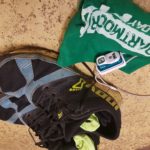The Darker months are a beautiful time of year to enjoy the outdoors. In recent years we’ve enjoyed long spells of sunshine, crisp mornings and days out on our favourite hills without the crowds, not to mention great foraging for wild snacks! However the autumn and winter months can also mean shorter days, colder temperatures and periods of heavy rain, frost and snow. So being well prepared is essential for stopping an awesome, adventurous day turning into an epic!
We’ve not got into the world of Ice axes, crampons, winter boots and other snow and ice kit here, we’ll save that for another blog post! (Coming soon).
- Map and compass. Either the ordnance survey explorer 1-25000 or the BMC/Harveys British mountain map 1-40000 are ideal. Make sure they are either laminated or in a good quality waterproof map case (don’t hang this around your neck as it doesn’t look cool and it’ll hit you in the face all day when its windy!) The Granite Trails team all use the silva type 4/54 compass, you should too! Sunnto and Recta also make great compasses. The compass is a delicate instrument, try not to have it swinging around your neck or dangling off your rucksack.
- Waterproof jacket and trousers. To be waterproof your jacket and trousers need taped seams to stop rain coming through, your jacket must have a good hood that pulls in around your face. Most importantly, put them on when it starts to rain!
- Warm layers. Start with a good base layer next to the skin, this will help you to feel comfortable. Then a fleece top, waffle or pile fabric is warmest. Take an extra booster layer this could be an extra fleece or a insulated duvet jacket, essential for when you stop moving.
- Head torch. Petzl and Black diamond make great head torches, we use the Tika XP and Spot regularly. The something between 70 and 300 lumens should do. Put new batteries in, it’s really difficult to change them in the dark when you’re torch stops working.
- Footwear. Think about you, what you’re doing and the terrain you’ll be in. If you plan to head for rough terrain, are carrying a heavy pack or expect cold weather, go for a good fitting pair of boots with ankle support. Wearing trainers or trail shoes is nice if you are going running or scrambling, but increases the chance of a sprained ankle (or worse), especially if you don’t go hill walking regularly and have developed good lower leg strength and walking/running technique in mountainous terrain.
- Food and Drink. Forget the diet for the day. If you are out for a big day you burn more than double your normal amount of calories. We try to eat something every hour to maintain a steady flow of energy, our favourites include- Peanut butter and jam sandwiches, Flapjacks, bananas, dried fruit and nuts. Take plenty of water and a small flask of your favourite hot drink, this can make things much better!
- Phone and cafe/beer money in waterproof pouch. Have your phone fully charged, keep it warm to help retain battery charge, turn off functions you don’t need. If you’re using apps like OS maps or view ranger to help with navigation or like taking lots of pictures, bring a portable battery charger.
- First aid kit and shelter. Keep the first aid kit minimal and go on a first aid course. Some kind of shelter can be a life saver if you have a problem, group shelters are amazing take one if you can. Single person shelters or bivi/survival bags can be useful if you are going super light or on your own, but won’t be much help to a hypothermic casualty.
- Hats and gloves, always bring them and bring spares! No gloves are completely waterproof and everyone has lost a hat to the wind at some point.
- Rucksack and drybags, no rucksack is waterproof so if it matters if that bit of kit gets wet it needs to be in a dry bag. A rucksack between 25 and 35 litres is plenty, we only carry bigger ones if we are camping out or going climbing.
So now you’ve got all the kit, you need to know how to use it! This is especially important when it comes to navigation and route choice. At Granite Trails, our highly qualified and experienced staff can help you to work on your skills to become independent in the hills and mountains.
Thanks for reading!



